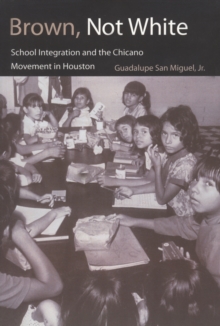
Musica Tejana : The Cultural Ecomomy of Artistic Transformation Paperback / softback
by Manuel Pena
Part of the University of Houston Series in Mexican American Studies series
Paperback / softback
Description
Texas-Mexican music, or musica tejana, is not one single music but several musical and musico-literary genres, ensembles, and their styles, encompassing the corrido, cancion, and what author Manuel Pena calls the cancion-corrido.
Musica tejana also includes two major regional ensembles and their styles--the conjunto and the Texas-Mexican version of the orquesta.
A more recent crop of synthesizer-driven ensembles and their styles, known since the mid-eighties as "Tejano," is another representative of musica tejana.
Despite their diversity, these various ensembles, genres, and styles share two fundamental characteristics: they are all homegrown, and they all speak after their own fashion to fundamental social processes shaping Texas-Mexican society.
As Pena persuasively argues, they represent a transforming cultural economy and its effects on Texas-Mexicans.
Pena traces the history of musica tejana from the fandangos and bailes of the nineteenth century through the cancion ranchera and the politically informed corrido to the most recent forms of Tejano music.
In the beginning, he argues, musicmaking was a function of "use-value"--its symbolic power linked to the social processes of which it was an organic part.
As musica tejana was swept into the commercial market, it added a second, less culturally grounded dimension--"exchange-value"--whereby it came under the culturally weakening influence of the commercial market.
Since the 1940s, the music has oscillated between the extremes of use- and exchange-value, though it has never lost its power to speak to issues of identity, difference, and social change.
Musica Tejana thus gives not only a detailed overview of musica tejana but also analyzes the social and economic implications of the music.
The breadth, depth, and clarity with which Pena has treated this subject make this a most useful text for those interested in ethnomusicology, folklore, ethnic studies, and Mexican American culture.
Information
-
Item not Available
- Format:Paperback / softback
- Pages:224 pages, 21 b&w photos, bibliography
- Publisher:Texas A & M University Press
- Publication Date:30/09/1999
- Category:
- ISBN:9780890968888
Information
-
Item not Available
- Format:Paperback / softback
- Pages:224 pages, 21 b&w photos, bibliography
- Publisher:Texas A & M University Press
- Publication Date:30/09/1999
- Category:
- ISBN:9780890968888










